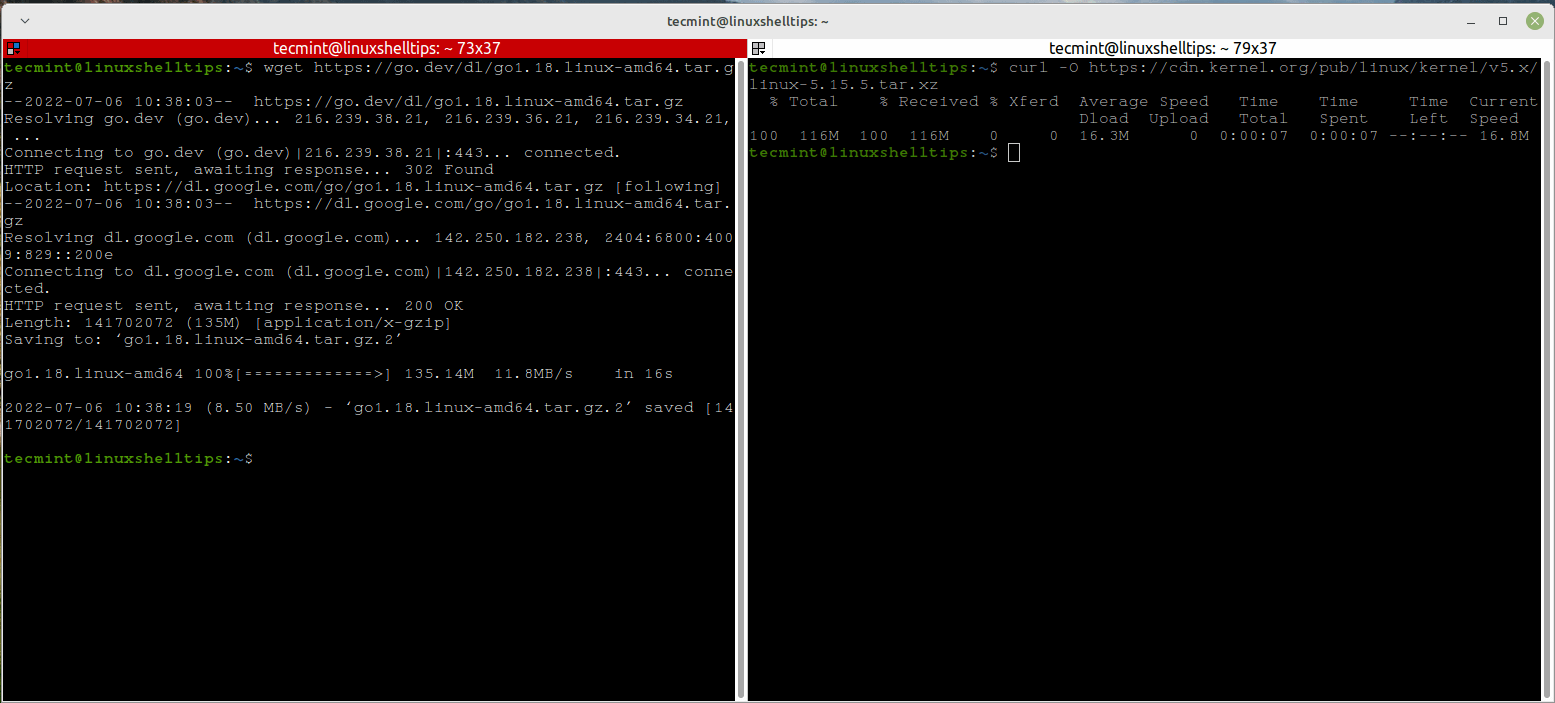At first glance, you are right to think that both curl and wget are Linux-based utilities used to transfer files over a network via the Linux command-line environment. However, as per the Linux manual page (man page):
- wget is defined as a non-interactive network downloader of web-based files.
- curl is defined as a URL tool used in the transfer of files from/to an active/running server.
The above statements check the comparison box of curl vs wget in terms of their definitions. However, you as a user need more data in the case of curl versus wget before you can comfortably settle for either of these tools.

This article will do its best to address this issue to your satisfaction.
Curl vs Wget Functional Similarities
Before we jump into their differences, let’s first look at what unites curl and wget file transfer tools.
- Both tools can only be used in the Linux command-line environment to transfer files based on FTP and HTTP(S) protocols.
- Their default functionality does not need user interaction.
- They are both free and open-source software.
- They are both portable and not limited to a single operating system distribution.
- They both support HSTS and HTTP proxy.
- HTTP POST requests can be sent via both curl and wget.
- HTTP cookies are supported by both tools.
What Differentiates Curl vs Wget?
Now that we know the commonalities of these two commands, it’s time to look at their differences.
- Protocols – More protocols are supported by curl than by wget.
- Curl-supported protocols are: HTTP, HTTPS, FTP, FTPS, FILE, DICT, TFTP, TELNET, SCP, SMPT, SMTPS, GOPHER, GOPHERS, LDAP, LDAPS, IMAP, IMAPS, RTMP, RTMPS, POP3, POP3S, RTSP, SFTP, SMB, SMBS, or MQTT.
- Wget supported protocols are: HTTP, HTTPS, and FTP.
- Library – Wget is not associated with any library as it is purely a terminal-based tool. As for curl, the cross-platform libcurl library powers it.
- Recursiveness – In comparison to curl, wget is stronger when dealing with recursive downloads as you only need to refer it to the remote source/URL containing the targeted file. Curl adheres to single-shot transfers.
- Pipes – With curl, everything is a pipe as stdout receives more stuff and stdin provides the output to be read. Therefore, curl is more like the traditional Unix cat command in terms of its implementation while wget mimics the implementation of the Unix cp command.
- Portability – Curl’s dynamic builds enable it to run on more platforms than wget. This list includes exotic platforms like TPF and OS/400.
- Upload and Download Capabilities – With wget, you can comfortably achieve plain HTTP POST support. On the other hand, curl makes it possible to upload and send data like email through the command-line environment.
- Parallel Transfers – Curl is capable of achieving multiple parallel transfers which is not the case with wget.
- Default Features – Most default features in wget like redirect-following and cookies are automatically enabled but with curl, most features need to be explicitly enabled.
Curl and Wget Installation in Linux
Now that you are familiar with the comparison chat between curl and wget, it’s up to you to decide whether to use either or both of these file transfer tools.
If they are not already installed on your machine, consider the following installation guide:
Install Curl in Linux
$ sudo apt install curl [On Debian, Ubuntu and Mint] $ sudo yum install curl [On RHEL/CentOS/Fedora and Rocky Linux/AlmaLinux] $ sudo emerge -a net-misc/curl [On Gentoo Linux] $ sudo pacman -S curl [On Arch Linux] $ sudo zypper install curl [On OpenSUSE]
Install Wget in Linux
$ sudo apt install wget [On Debian, Ubuntu and Mint] $ sudo yum install wget [On RHEL/CentOS/Fedora and Rocky Linux/AlmaLinux] $ sudo emerge -a net-misc/wget [On Gentoo Linux] $ sudo pacman -S wget [On Arch Linux] $ sudo zypper install wget [On OpenSUSE]
For example usage of both commands, check the following articles:
- How to Fix curl: (6) Could not resolve host Error in Linux
- How to Set Connection Timeout in Curl Command
- How to Send Email Using Curl Command in Linux
- How to Download Files with Wget Command in Linux
- How to Set Wget Connection Timeout in Linux
- How to Hide Wget Command Output in Linux Command Line
If there is a key difference between curl and wget that you think is worth mentioning feel free to leave a comment.

I count 3 protocols for curl and 26 for wget. So how does curl have more protocols than wget?
@Mike,
I have corrected the article, sorry for the misguiding…
Based on the data given, I think you have this statement reversed: “Protocols – More protocols are supported by curl than by wget.” Or else you have the data section reversed.
@Curtis,
Yes, I have corrected the article with the correct information…
Protocols – More protocols are supported by curl than by wget.
Curl-supported protocols are: HTTP, HTTPS, and FTP.
Wget supported protocols are: HTTP, HTTPS, FTP, FTPS, FILE, DICT, TFTP, TELNET, SCP, SMPT, SMTPS, GOPHER, GOPHERS, LDAP, LDAPS, IMAP, IMAPS, RTMP, RTMPS, POP3, POP3S, RTSP, SFTP, SMB, SMBS, or MQTT.
This makes no sense at all. If curl supports 3 protocols and wget supports 26, how does curl support more than wget? Did you get them the wrong way round?
@Clasqm,
Sorry for misguiding, I have corrected the article with the correct information…